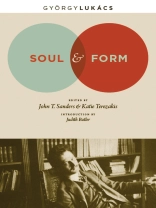György Lukacs was a Hungarian Marxist philosopher, writer, and literary critic who shaped mainstream European Communist thought. Soul and Form was his first book, published in 1910, and it established his reputation, treating questions of linguistic expressivity and literary style in the works of Plato, Kierkegaard, Novalis, Sterne, and others. By isolating the formal techniques these thinkers developed, Lukács laid the groundwork for his later work in Marxist aesthetics, a field that introduced the historical and political implications of text.
For this centennial edition, John T. Sanders and Katie Terezakis add a dialogue entitled ‘On Poverty of Spirit, ‘ which Lukács wrote at the time of Soul and Form, and an introduction by Judith Butler, which compares Lukács’s key claims to his later work and subsequent movements in literary theory and criticism. In an afterword, Terezakis continues to trace the Lukácsian system within his writing and other fields. These essays explore problems of alienation and isolation and the curative quality of aesthetic form, which communicates both individuality and a shared human condition. They investigate the elements that give rise to form, the history that form implies, and the historicity that form embodies. Taken together, they showcase the breakdown, in modern times, of an objective aesthetics, and the rise of a new art born from lived experience.
Inhoudsopgave
Preface
Introduction Judith Butler
1. On the Nature and Form of the Essay: A Letter to Leo Popper
2. Platonism, Poetry and Form: Rudolf Kassner
3. The Foundering of Form Against Life: Søren Kierkegaard and Regine Olsen
4. On the Romantic Philosophy of Life: Novalis
5. The Bourgeois Way of Life and Art for Art’s Sake: Theodor Storm
6. The New Solitude and Its Poetry: Stefan George
7. Longing and Form: Charles-Louis Philippe
8. The Moment and Form: Richard Beer-Hofmann
9. Richness, Chaos, and Form: A Dialogue Concerning Lawrence Sterne
10. The Metaphysics of Tragedy: Paul Ernst
Sources and References
On Poverty of Spirit: A Conversation and a Letter
Afterword: The Legacy of Form Katie Terezakis
Notes
Index
Over de auteur
György Lukács (1885-1971) is the author of Theory of the Novel, History and Class Consciousness, The Destruction of Reason, and The Ontology of Social Being, among many other works. John T. Sanders is professor of philosophy at the Rochester Institute of Technology. He is the author of The Ethical Argument Against Government and coeditor of both Debating the State of Philosophy: Habermas, Rorty, and Kolakowski and For and Against the State: New Philosophical Readings. Katie Terezakis is assistant professor of philosophy at the Rochester Institute of Technology and the author of The Immanent Word: The Turn to Language in German Philosophy, 1759-1801 and the editor of Engaging Agnes Heller: A Critical Companion. Judith Butler is the Maxine Eliot Professor in the Department of Rhetoric and Comparative Literature at the University of California at Berkeley and author of Gender Trouble, The Psychic Life of Power, and Subjects of Desire, among other works. Anna Bostock is also the translator of Lukács’s The Theory of the Novel.












